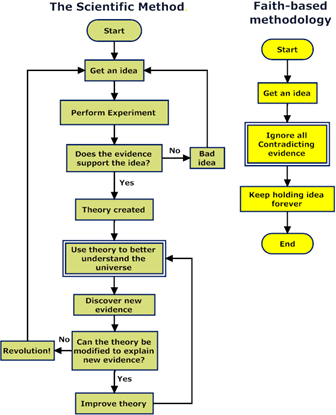A Science Lesson for Christians
 Often times when discussing religion with Christians the conversation turns to science. I am not an expert in the sciences. My field is Philosophy. Just to make sure that I have all my facts straight, I e-mailed this blog to The Science Pundit for peer review. However, having gone to a fairly decent public school program which taught science fairly well, I would say that I have a slightly above average knowledge of the subject. I am beginning to think though that I am a bit more than just slightly above average. It seems that I run into the same problems over and over again. Many of the Christians that I talk to have no idea how the scientific method works.
Often times when discussing religion with Christians the conversation turns to science. I am not an expert in the sciences. My field is Philosophy. Just to make sure that I have all my facts straight, I e-mailed this blog to The Science Pundit for peer review. However, having gone to a fairly decent public school program which taught science fairly well, I would say that I have a slightly above average knowledge of the subject. I am beginning to think though that I am a bit more than just slightly above average. It seems that I run into the same problems over and over again. Many of the Christians that I talk to have no idea how the scientific method works.
The thing is that most of these Christians claim to know how science works and they claim to have studied in detail the relevant scientific theories that we are discussing. But then their mouths open (or in case of internet conversations, they write stuff). And based on what they are saying, it becomes painfully obvious that they have not studied the relevant theories and have no idea whatsoever how science works.
There are a few particular misconceptions that keep popping up. The first is that a “scientific theory” is “just a theory.” Here there is as Wittgenstein put it, a “Family Resemblance” between the two uses, but make no mistake that the term “theory” is being used in two very different ways. In the general sense the term “theory” is used to describe an analytic structure designed to explain a set of observations. As used in the scientific sense, a theory is an explanation or model based on observation, experimentation, and reasoning, especially one that has been tested and confirmed as a general principle helping to explain and predict natural phenomena. In other words, “just a theory” is very different than a “scientific theory” which has considerably more weight attached to it.
Another common misconception is that science is “faith based” just as faith based belief is faith based. These particular Christians don’t seem to understand the difference between the scientific process and the religious process. To them, all ideas are the same and deserve equal time. The problem is that all ideas are not the same.
Let’s start with religion. The way religious belief works, they start off with the belief in God and in the Bible. That belief supersedes everything else. Then they specifically look to find anything which might be considered supportive of their conclusion (This is called “confirmation bias.” The scientific method goes to extreme measures to minimize or eliminate this as all people—even scientists—are susceptible to confirmation bias). If evidence comes to light which disproves their belief, that evidence is attacked, ignored, and/or destroyed. Their view is that God exists and that the Bible is true and nothing “science” can say or show will convince them otherwise. Many times, they will even tell you that straight up.
Science doesn’t start with the conclusion. Science starts with observations. From the observations we make a hypothesis, which is an educated guess as to the explanation of an observable phenomenon or phenomena which makes predictions and is therefore testable. We then look for evidence and/or test the hypothesis through experimentation to see if our hypothesis holds up. One thing science tries to be very careful about is to make sure that when we run tests and look for evidence we do so in as non-biased manner as possible. We don’t want to fall prey to confirmation bias. We are not specifically looking to confirm or deny the hypothesis, just go where the evidence leads. If the evidence supports the hypothesis, then we keep looking for more evidence in the same unbiased manner. If the evidence does not support the hypothesis, then we revise the hypothesis and start the process over again. Science never draws a 100% certain conclusion. Science is always willing to change. But the more and more evidence which supports a given hypothesis the more and more certain we are that the hypothesis is correct. But we will never say that we are 100% certain. A theory is a more general model which includes facts, laws and hypotheses and explains a whole family of phenomena.
So as you can see, while science starts with observations and evidence and investigates as non-biased as it can, religion is the exact opposite. Religion starts with the conclusion and looks in a biased manner for anything which could be persuasive and rejects what does not fit with the already stated conclusion (i.e. God exists and the Bible is true).
Please keep in mind that this blog is only giving a basic and quick guide to science and the scientific method. I encourage anyone who lacks sufficiant scientific knowledge to go online or pick up a science text book and learn more.





